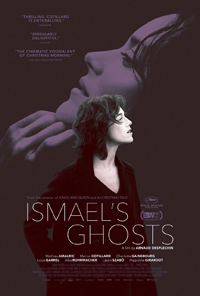Call Me, Ismael: Desplechin Presents Jumbled Portrait of the Artist as a Dulled Man
 Perhaps not since the quill of Charles Dickens, wherein iconic Ebenezer Scrooge of A Christmas Carol, a privileged, self-absorbed prig, is supernaturally motivated to reexamine his outlook, has a character been so literally haunted by his past as in Ismael’s Ghosts, the latest offering from French master Arnaud Desplechin. Employing his usual offbeat dissection of estranged (and just strange) family members as they float in and out of one another’s lives through his usual on-screen alter ego Mathieu Amalric, this time around Desplechin perplexes with tangential subplots and schizophrenically administered characterizations in this collapsible love triangle between a filmmaker, an astrophysicist, and the gal who got/ran away.
Perhaps not since the quill of Charles Dickens, wherein iconic Ebenezer Scrooge of A Christmas Carol, a privileged, self-absorbed prig, is supernaturally motivated to reexamine his outlook, has a character been so literally haunted by his past as in Ismael’s Ghosts, the latest offering from French master Arnaud Desplechin. Employing his usual offbeat dissection of estranged (and just strange) family members as they float in and out of one another’s lives through his usual on-screen alter ego Mathieu Amalric, this time around Desplechin perplexes with tangential subplots and schizophrenically administered characterizations in this collapsible love triangle between a filmmaker, an astrophysicist, and the gal who got/ran away.
In the vein of his celebrated A Christmas Tale (2008), what begins like the romantically inclined version of Diaboliques (1955) quickly stagnates into variegated vignettes on a character who’s constant state of dishevelment is his only real defining factor. While a shortened version opened the 2017 Cannes Film Festival (albeit out-of-competition), Desplechin’s director’s cut of the film will be the theatrical release, which includes an additional twenty minutes to the already extensively labored running time to tell the somewhat obnoxious tale about a slightly irresponsible man and his tedious romances with a trio of fantastic women.
For those who’ve been eager to keep up with the historical records of Desplechin’s universe, Amalric is resurrecting the character of Ismael Vuillard, last seen in the 2004 film Kings and Queen (certain remnants of his existence in the earlier title receive passing reference here, but usually to confounding effect if one’s not familiar with his earlier iteration). Just as he’s about to embark on a new film project based on the espionage tinged tale of his brother Ivan Dedalus (Louis Garrel, here playing a character who shares the surname of the man Amalric has most often portrayed in Desplechin world, the vibrant lothario Paul Dedalus, last seen in the celebrated 2015 title My Golden Days), Ismael runs into trouble.
While Ivan wants little to do with his estranged older brother, the project seems to bring Ismael to the precipice of new transitions. As he pursues a heated affair with astrophysicist Sylvia (Charlotte Gainsbourg playing a melancholically inclined prude whose occupation seems to be more a metaphor than reality), his ex-wife Carlotta (Marion Cotillard, who appeared, briefly, in Desplechin’s 1996 title My Sex Life…Or How I Go Into an Argument as one of Dedalus’ minor conquests) suddenly reappears after having disappeared two decades prior.
We learn Carlotta’s identity was overshadowed by her filmmaker father (Laszlo Szabo in an unnecessary role) and then her husband. The emotional trauma of the two men having to declare her dead after an absence that long comes back with a vengeance. Consumed by jealousy, the pregnant Sylvia absconds, leaving Ismael to deal with Carlotta. Instead, he veers off into work troubles, abandoning his project (a desperate producer played by Hippolyte Girardot, a lithesome actress played by Alba Rohrwacher, and a briefly entertaining Jacques Nolot factor into this portion) deciding to pursue Sylvia as Carlotta makes an irrational reentry into her father’s life.
There are nuggets of wisdom in an exercise like Ismael’s Ghosts—do we ever leave behind the formative experiences from the past or do they continually influence and haunt what we experience as our present? And at times, this seems a novel exercise, wherein Desplechin fashions Ismael’s experience as a time warp scenario with a vengeance. However, we’re completely estranged from Ismael and his lovers, the emotional grandstanding staged like a self-aware dark comedy, negating the emotional breadth of what such a situation would actually command.
Instead, Desplechin seems to be content with distracting us from actually dealing or experiencing Ismael’s unique situation, giving us asides like an embarrassing face off with a flight attendant when Szabo’s Henri Bloom demands to drink his own champagne on the way to attend a retrospective of his work in Israel.
Mottled diatribes about terrorism and privilege provide a punchline for the film’s only laugh-out-loud cut away, and yet even this seems like another random point lost in a sea of such instances with a bunch of self-centered irresponsible characters who don’t ever seem aware of the effects their actions have on countless numbers of those around them.
In essence, Desplechin has concocted his own particular brand of listless art-house navel gazing, and Ismael’s Ghosts are neither haunting nor notable apparitions (and yet, it’s still better than 2013’s Jimmy P.).
★★/☆☆☆☆☆


